

The 14 Habits of Highly Miserable People. Photo Credit: Shutterstock.com/aastock November 18, 2013 | Like this article?

Join our email list: Stay up to date with the latest headlines via email. Meaning Is Healthier Than Happiness. Health.
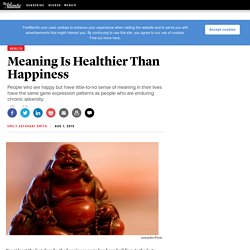
Make your life better by sending five simple emails. Make an Extraordinary Effort. Followup to: Trying to Try, Tsuyoku Naritai "It is essential for a man to strive with all his heart, and to understand that it is difficult even to reach the average if he does not have the intention of surpassing others in whatever he does.
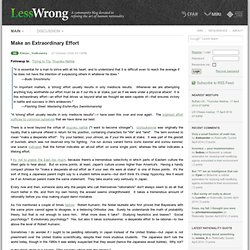
" Richard Wiseman - Research. This project scientifically explores why some people live such charmed lives, and develops techniques that enable others to enhance their own good fortune.
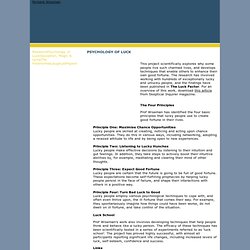
The research has involved working with hundreds of exceptionally lucky and unlucky people, and the findings have been published in The Luck Factor. For an overview of this work, download this article from Skeptical Inquirer magazine. The Four Principles Prof Wiseman has identified the four basic principles that lucky people use to create good fortune in their lives. Principle One: Maximise Chance Opportunities Lucky people are skilled at creating, noticing and acting upon chance opportunities.
Curiosity, an Engine of Well-being: An Interview with Todd Kashdan, Part I. Kathryn Britton, MAPP '06, former software engineer, is a coach working with professionals to increase well-being, energy, and meaning (Theano Coaching LLC).
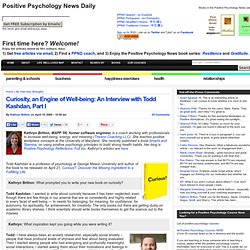
She teaches positive workplace concepts at the University of Maryland. She recently published a book,Smarts and Stamina, on using positive psychology principles to build strong health habits. Nancy Etcoff: Happiness and its surprises. What makes us happy? Gross national happiness. Slogan about Gross National Happiness in Thimphu's School of Traditional Arts.
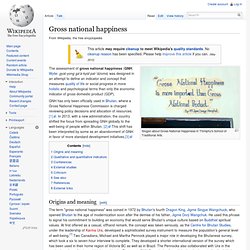
The assessment of gross national happiness (GNH; Wylie: gyal-yong ga'a-kyid pal-'dzoms) was designed in an attempt to define an indicator and concept that measures quality of life or social progress in more holistic and psychological terms than only the economic indicator of gross domestic product (GDP). GNH has only been officially used in Bhutan, where a Gross National Happiness Commission is charged reviewing policy decisions and allocation of resources. [1]. In 2013, with a new administration, the country shifted the focus from spreading GNH globally to the well-being of people within Bhutan. [2] This shift has been interpreted by some as an abandonment of GNH in favor of more standard development initiatives.[3] Origins and meaning[edit] What is "Gross National Happiness" ? Explained by Morten Sondergaard. Gross national happiness in Bhutan.wmv.
The Thirty Two Building Blocks. 21 Must-Read Articles on Happiness. Rewire Your Brain for Positivity and Happiness Using the Tetris Effect. "Everything is amazing and nobody is happy" - a Fu. Questioning Decisions Can Lead to Unhappiness. By Rick Nauert PhD Senior News Editor Reviewed by John M. Grohol, Psy.D. on December 16, 2011 For some, it is hard to be satisfied as we consistently wonder if we have done the right thing. Now, researchers have determined overanalyzing and then second guessing one’ decisions can lead to stress and unhappiness. Psychologist have termed individuals who obsess over decisions — big or small — and then fret about their choices later as “maximizers.” “Satisfiers,” on the other hand, tend to make a decision and then live with it. A new study sheds light on why it is difficult for some to make a decision that they can be happy with. Dr. Ehrlinger’s research on decision making is found in the journal Personality and Individual Differences.
As a result, the authors argue, “maximizers miss out on the psychological benefits of commitment,” leaving them less satisfied than their more contented counterparts, the satisfiers. “Current research is trying to understand whether they can change,” she said. Stumbling on Happiness by Daniel Gilbert. Dan Gilbert asks, Why are we happy? Stumbling on Happiness: Daniel Gilbert. I recently wound up in the emergency room.
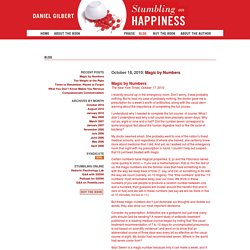
Don’t worry, it was probably nothing. But to treat my case of probably nothing, the doctor gave me a prescription for a week’s worth of antibiotics, along with the usual stern warning about the importance of completing the full course. I understood why I needed to complete the full course, of course. What I didn’t understand was why a full course took precisely seven days.
Why not six, eight or nine and a half? My doctor seemed smart. Certain numbers have magical properties. But these magic numbers don’t just dominate our thoughts and dictate our words; they also drive our most important decisions. Consider my prescription. Italy! Magic “time numbers” cost a lot, but magic “10 numbers” may cost even more. And yet, research shows that fingers affect finances. The hand is not the only part of our anatomy that gives certain numbers their magical powers. The sound a number makes can influence our decisions about it. Daniel Gilbert - The Colbert Report - 2007-27-06. The happiness diet. Forty percent of our happiness may be within our power to control--and making ourselves happier could take less than 10 minutes a day, according to University of California, Riverside, psychology professor Sonja Lyubomirsky, PhD. Winner of the 2002 Templeton Positive Psychology Prize, Lyubomirsky has been researching happiness for nearly two decades and is leading the way in the scientific study of interventions that lastingly increase human happiness, says former APA President and fellow positive psychologist Martin E.P.
Seligman, PhD. Backed by a five-year $1 million grant from the National Institute of Mental Health, Lyubomirsky--along with colleague Ken Sheldon, PhD--is exploring the potential of happiness-sustaining strategies, such as expressing gratitude and reflecting on happy moments, to permanently bolster one's happiness level. Why research happiness? Happiness is the Holy Grail of science. Richard Wiseman - Research. 10 Simple Things to Make You Happier At Home.